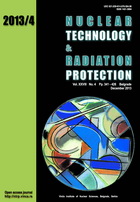
A MULTI-YEAR STUDY OF RADIOACTIVITY IN SURFACE AIR AND ITS RELATION TO CLIMATE VARIABLES IN BELGRADE, SERBIA

Vol.
XXVIII, No. 4, Pp. 341-426
December 2013
UDC 621.039+614.876:504.06
ISSN 1451-3994
Pages: 381-388
Authors: Jelena V. AjtiŠ, Dragana J. TodoroviŠ, Jelena D. NikoliŠ,
Vladimir S. DjurdjeviŠ
Abstract
Activities of 7Be and 210Pb were monitored in surface air in Belgrade, Serbia, from 2004 to 2012. The measurements were taken from two locations, in an open field of a city suburb and in the central city area. The activities were determined on HPGe detectors by standard gamma spectrometry. The 7Be activity shows a pronounced seasonal pattern, with the maximum in spring-summer and minimum in winter, while the 210Pb activity exhibits two maxima, in autumn and late winter. The mean monthly concentrations measured at both sites are below 9 mBq/m3 and 1.3 mBq/m3 for 7Be and 210Pb, respectively. The obtained correlation of the 7Be activity with the number of sun-spots is not statistically significant. Relations of the radionuclides' activities with climate variables (precipitation, temperature, relative humidity, cloud cover, sunshine hours, and atmospheric pressure) are also investigated, but the only significant correlations are found for the 7Be activity with temperature and sunshine hours, and the 210Pb activity with atmospheric pressure. The maximum 7Be and 210Pb activities corresponding to binned total monthly precipitation data imply different modes of the radionuclide scavenging from the atmosphere. During dry periods, accumulation of the radionuclides in the atmosphere leads to their increased activities, but no correlation was found between the activities and the number of consecutive dry days.
Key words: radioactivity, beryllium-7, lead-210, air, sun-spot number, climate variable
FULL PAPER IN PDF FORMAT (1,42 MB)